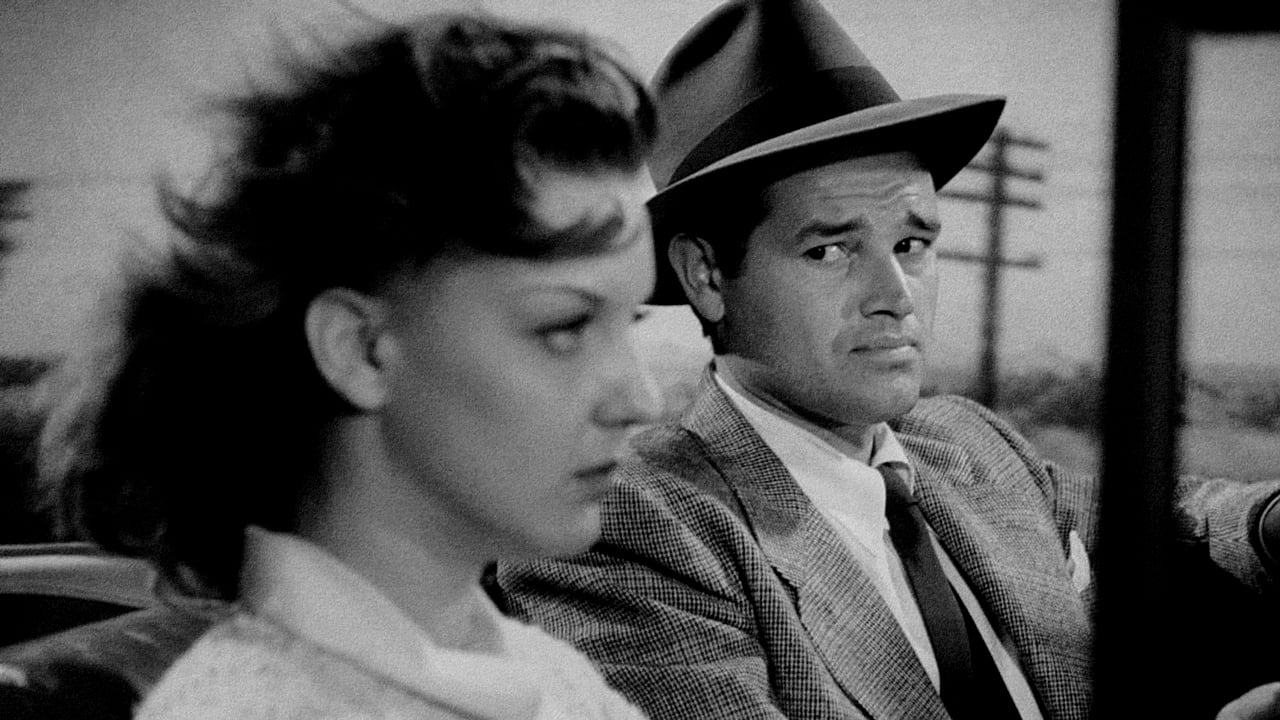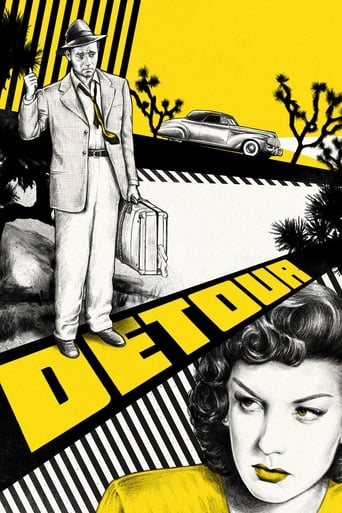mgtbltp
A shoestring 67 minute production that effectively distilled 100 proof Noir.While the credits roll we see the desolate landscape of the desert from a vehicle barreling down a two lane highway, What's unusual about this barren landscape is that we are driving away from it. The scenery is passing us and receding into the distance, we are leaving what we know behind and we don't know what lies ahead. We are on a Detour and speeding towards oblivion, a Detour that's a metaphor for Destiny. The Destiny of one Al the Piano Player, late of the Break o' Dawn Club, Upper West Side Manhattan. Al had a steady gig tickling the ivories of the coffin with a bunch of hep cats in a combo, nightly at the Break O' Dawn Club, a smoke choked West side hole in the wall lounge. What made it bearable was Sue the cute peroxide canary, a real looker, and love of his life, as Al put it, he was a healthy American male and she was a healthy American babe and they had a healthy romantic relationship. One night as the club is closing Al, smoking like a Con-Ed stack, is pounding out a classical tune solo while waiting for Sue to change. When she arrives she tells him that" he'll make it to Carnegie Hall someday," he snaps back cynically, "Sure, as a janitor. Maybe I'll make my debut in the basement, Yeah, someday if I don't get arthritis first." He closes the fallboard and with a cigarette sticking to his lower lip declares "Let's blow this trap." As they walk uptown through the Hudson River fog (a clever low budget sequence that show just the tops of passing street signs sticking up through the dry ice fog) Sue gives Al the brush, she tells him that she wants a shot at the Big Time, Hollywood, Tinseltown. For Al, life without Sue makes him feel blue and dejected, playing for the café society patrons nets him an occasional ten spot tip. After a few months he decides to blow, he calls Sue from the club's phone booth and finds out that she's a waitress slinging hash in a beanery. Al tells her that he'll be right out, but he doesn't tell that he has no bread and will have to hitch. In Arizona he gets picked up by a pill popping bookie driving a 41' Lincoln convertible, name of Charlie Haskell, and he's traveling from New Orleans to LA. It's Al's lucky day, or is it? As they speed across the desert Charlie asks Al to get him the box of pills in the glove box, he does this a few more times apparently Charlie has some ailment. In the evening after buying Al a meal at a truckstop, Al notices some fresh scars above Charlie's wrist as he drives down the highway. Charlie notices Al looking, and tells him that a crazy broad he picked up gave them to him. A few hours later Charlie asks Al to drive. As Al tools along, in a nice noir stylistic sequence we see Al's eyes through the rearview mirror which segues into what is Al's last happy memory. We see Sue singing "their song" against a backdrop of shadow musicians. It's late night, Al is beginning to fall asleep at the wheel, we see his head nodding. A few sprinkles soon turns into a downpour. Al pulls over, they have to put up the top, he tries to wake Charlie who is unresponsive. Al gets out, and goes around to the passenger side, he opens the door and Charlie's dead body slumps out of the seat and caves his head in on a boulder. Al just bought a one way ticket to Noirsville. Al panics in genuine fear and desperation, he reasons that dressed they way he is and with no scratch in his pockets the cops will tag him for Charlie's murder, they'll never believe his story of what actually happened. Al decides to drag Charlie into the bottom of a gully, grab his wallet, assume his identity and toss his own suitcase and wallet down in with Charlie. He'll take the 700 clams and drive the car to LA then sell it. Al pulls off at the next motel and gets a room, the next morning he's showered, shaved, and dressed in Charlie's clothes. Back on the road to LA, Al stops to add water to the radiator. He sees a woman, Vera, (Ann Savage) standing at the side of the road hitching and yells out to her, even though "she looks like she just got thrown off the crummiest freight train in the world". Deciding to give her a lift, that ticket to Noirsville just got upgraded to express. Vera looks like she was ridden hard and put away wet, greasy dirty blond hair, rumpled and stained sweater and skirt, a lot of rough miles on her chassis. She's quite at first almost stone like but turns verbally ferocious practically spitting and hissing her razor sharp dialog, your worst nightmare a 24 year old Medusa who will turn your heart to stone. Savage is, quite possibly, the most terrifyingly vicious Femme Fatale of Classic Noir. Vera's arrival brings the film to a whole new level Vera also brings one of the greatest Noir twists to the plot of Detour, if you thought it couldn't get any worse for Al, your in for a shock. Detour, a "Poverty-Row" production was shot on a few cheap sets in 6 days. But it was a flare at the end of a dark tunnel showing a way to other cash strapped film-makers to make something out of nothing. Music by Leo Erdody, Sound engineer Max Hutchinson. a 9/10
sterlingwritesit
Watching Detour, it becomes apparent immediately that the movie was made on the cheap. The film relies on extensive rear projection work and shies away from using exteriors. All of this contributes to a certain cramped feel. This modest production is extremely effective nonetheless due to a few factors.First of all, we get a great raw-nerved, vulnerable performance from Tom Neal as our protagonist. This is complemented nicely by a vicious turn from Ann Savage as a hitchhiking femme fatale. Meanwhile, the script contributes several gems of dialogue that allow the two to really stand out. The limitations of the production actually work in the movie's favor. The cramped, constricted environment in which the characters operate becomes a pressure cooker, heightening the sense of dread as emotions boil over. On the negative side, the movie does fall victim to some clunky editing. This, along with a few other minor issues keeps me from rating this more highly.Bottom line: Worth your time for the performances of the two leads, especially if you're a film noir fan.
Ben Larson
When the pianist Al Roberts gets tired of being miserable and missing his girlfriend who traveled across the country to seek her fortune in Hollywood, he decides to leave New York behind. He has no money to pay for the trip from one coast to the other, so he decides to hitchhike, something that proves to be his downfall. A man who picked him up dies during the journey and Al panics when he pessimistically expects to be accused of the death. He steals not only the man's car, but also his identity and stows away the corpse in a ditch. He then decides to pick up a hitchhiker named Vera, but he will soon regret it because she seems to know his dark secret and will not hesitate to take advantage of it.The story feels more than a little strained on more than one occasion. It's hard not to fall in love the hopelessness that constitutes Detour. A low-budget thriller directed by Edgar G. Ulmer. Sure, it's an extremely simple B-movie, but it is packed full of interesting quotes, friendly cynicism, pitch black darkness and at least as much rain. It is insanely entertaining to see Vera and Al throw sharp barbs at each other while the tones are so miserable that they find it hard to laugh at them.With a playing time of over 70 minutes says Detour goodbye long before it has time to start to feel tiring.
Rob Starzec
As I mentioned to my brother that I had watched this film he informed me that it basically had no budget. This made a great deal of sense to me since I did not see much production value in it - this was noticeable even with it being an older film. To me Detour seems like a very rushed attempt at trying to make a noir film that works - not necessarily a great noir film, but one that fits the tenants of the genre. We start with Al Roberts as the wanderer who chooses not to be sociable; there is something troubling him, and he conveys this through, what seems to me to be, over-acting. We get a shift in chronology (a tenant of film noir which I love) and flash back to when he was a pianist and happy with a girlfriend, and this is where his journey begins. He needs to travel west to be with his beloved, but he needs to hitchhike in order to do so. Roberts meets a man named Haskell and the titular detour to where Roberts needs to go occurs on this journey. He inconveniently ends up in a situation where Haskell dies from what seems to be an accidental hit on his head as he falls out of the car. Then, because plot, Roberts happens to unknowingly stumble across Haskell's wife at a gas station, and he allows her to ride with him. As a complicated love triangle is almost formed, Haskell's wife blackmails Roberts into helping her squeeze money out of Haskell's car and inheritance by threatening to bring her husband's murder to the police. Once again, because plot, Roberts accidentally (yes it was an accident with a phone line) strangles Vera and kills her. He becomes the typical unreliable noir narrator at this point since this could have likely gone another way. All of this was rushed in just over the span of an hour. It is a noir film that has a cohesive plot, but evoked little interest from me. The ending voice-over about his acceptance of getting picked up one day over the image of him actually getting picked up by authorities was intriguing, but not the sort of ending which would rank this film among the likes of Sunset Boulevard or Double Indemnity.

